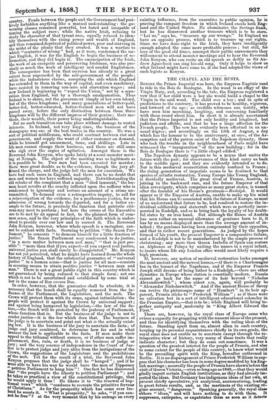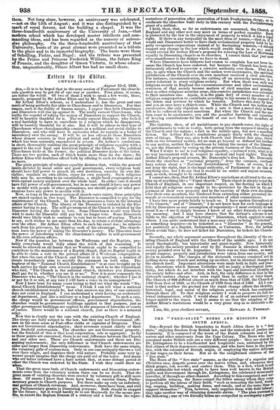THE CHAPEL AND THE BUSTS.
BEFORE the Prince Imperial was born, the Empress Eugenie used to ride in the Bois de Boulogne. In the wood is an effigy of the Virgin Mary, and, according to the tale, the Empress registered a vow that if her child were a boy she would build a chapel to the Virgin in the said wood. The child was a boy ; and in spite of predictions to the contrary, it has proved to be healthy, vigorous, and forward of its age ; as credible witnesses can testify, who have seen him marching, laughing, and conversing familiarly with those round about him. In short it is already ascertained that the Prince Imperial is not only healthy and longlived, but judicious and affable, and that he has a large affection for the French people. The vow has evidently been effectual in an un- usual degree ; and accordingly on the 15th of August, a day which has the honour to be the anniversary, at once, of the As- sumption and of the patron saint of the Napoleon dynasty, those who took the trouble in the neighbourhood of Paris might have witnessed the "inauguration" of the new building ; for in the Bois de Boulogne there is "a little chapel edified."
The Napoleon dynasty appears to be a nexus that unites the future with the past ; for observances of this kind carry us back to the middle ages; • and they are evidently intended so to do. Nor is this mediieval resuscitation entirely confined to France ; the rising generation of imperials seems to be destined to that species of artistic restoration. Young Europe like Young England, is decidedly medisevaL The great rival of France, Austria, is joining in the backward race, aud the future Emperor of that alien sovereignty, which comprises so many great states, is named after the founder of his House's greatness—Rudolph. It would appear as if the Emperor of Austria, unable to make up his mind that his House canly.1 associated with the future of Europe, as most of us understand that future to be, had resolved to restore the in- dividual soldiership and statecraft which were so perfectly incor- porated in Rudolph, and so to bring back the loyalty of his doubt- ful states by an iron hand. But although the House of Austria has seen rather an unusual allowance of geniuses born to it, it has by no means displayed more than the average amount of in- tellect; the geniuses having been compensated by their opposites, and that in rather recent generations. As judged by the hopes formed of his youth, the present Emperor is a comparative failure, and a Rudolph is not to be manufactured by the simple process of christening ; any more than Queen Isabella of Spain can restore an Alphonso or Pelayo by uniting the names in a royal infant, to insure whose life any London office would most likely require a high premium. If, however, any notion of mediceval restoration lurks amongst the most ancient and the newest houses,—if there is a Charlemagne bee in the bonnet of the Napoleons and if the Emperor Francis Joseph still dreams of being father to a Rudolph,—there are other dynasties in Europe whose station is essentially modern. Russia cannot go back for the name of its heir beyond "Nicholas Alexandrowitch " ; whose eldest ma, again, will probably be "Alexander Nicholaewitch." And if the ancient House of Savoy can revive the picturesque name of " Humbert " in its heir ap- parent, Prussia sticks to "Frederick William" ; as if there were no salvation but in a sort of intelligent educational coloneloy in the Prussian Empire,—that is to be; while England will bring to- gether antiquity and ,.modernity in "King Albert Edward the First."
There are, however, in the royal class of Europe some who evince a capacity for grappling with the nascent ideas of the present, and thus for identifying themselves with the ruling ideas of the future. Standing apart from us, almost alien in each country, keeping up its personal acquaintances chiefly in its own grade, the royal class does not enable us to ascertain except through the re- trospective view of history, very many of those traits that really indicate character ; but they do come out sometimes. It was a question of the greatest interest for the people of Prussia, and also to some extent for the people of this country, to know what would be the prevailing spirit with the King, hereafter enthroned in Berlin. It is no disparagement of Prince Frederick William to sup- pose that his character has been in some degree modified by his Eng- lish marriage ; assuredly the people of Prussia have shown before the visit of Queen Victoria,—even so long ago as1848,—that they would gladly import certain English institutions, as they had already im- ported the ideas. But Germany has indigenous ideas of her own, at present chiefly speculative, yet analytical, anatomatizing, leading to great future results, and, as the martinets of the existing re- gime account, "dangerous." Speaking generally, the royal class abhors "ideas," and will have nothing to do with them. It suppresses, extirpates, or expatriates them as soon as it detects them. Not long since, however, an anniversary s celebrated, —not on the 15th of August ; and it was also distinguishedby a mark of royal favour, not the building a chapel. It was the three-hundredth anniversary of the University of Jena,—that modern school which has developed master intellects and com- manding ideas, and has been regarded as the nursery of subver- sive philosophy. On the three-hundredth anniversary of that University, busts of its great alumni were presented as a tribute to the place and to its immortal biography. The busts were those of Sehelling, Fichte, and Hegel ; and the tribute was presented by the Prince and Princess Frederick William, the future King of Prussia, and the daughter of Queen Victoria, in whose educa- tion, unquestionably, Prince Albert has had no small share.



































 Previous page
Previous page